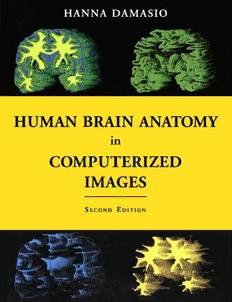Table Of ContentHuman Brain Anatomy
IN COMPUTERIZED IMAGES
This page intentionally left blank
Human Brain Anatomy
IN C O M P U T E R I Z ED I M A G ES SECOND EDITION
HANNA DAMASIO, M.D.
Professor of Neurology and Director
of the Human Neuroanatomy and Neuroimaging Laboratory
at the Department of Neurology
University of Iowa College of Medicine
OXPORD
UNIVERSITY PRESS
2005
OXFORD
UNIVERSITY PRESS
Oxford University Press, Inc., publishes works that further
Oxford University's objective of excellence
in research, scholarship, and education.
Oxford New York
Auckland Cape Town Dar es Salaam Hong Kong Karachi
Kuala Lumpur Madrid Melbourne Mexico City Nairobi
New Delhi Shanghai Taipei Toronto
With offices in
Argentina Austria Brazil Chile Czech Republic France Greece
Guatemala Hungary Italy Japan Poland Portugal Singapore
South Korea Switzerland Thailand Turkey Ukraine Vietnam
Copyright © 1995, 2005 by Oxford University Press, Inc.
Published by Oxford University Press, Inc.
198 Madison Avenue, New York, New York 10016
www.oup.com
Oxford is a registered trademark of Oxford University Press
All rights reserved. No part of this publication may be reproduced,
stored in a retrieval system, or transmitted, in any form or by any means,
electronic, mechanical, photocopying, recording, or otherwise,
without the prior permission of Oxford University Press.
Library of Congress Cataloging-in-Publication Data
Damasio, Hanna.
Human brain anatomy in computerized images / Hanna Damasio.—2nd ed.
p. ; cm.
Includes bibliographical references and index.
ISBN-13 978-0-19-516561-6
ISBN 0-19-516561-6
1. Brain—Tomography—Atlases. 2. Brain—Magnetic resonance imaging—Atlases. I.
Title.
[DNLM: 1. Brain—anatomy & histology—Atlases. 2. Image Interpretation,
Computer-Assisted—Atlases. 3. Magnetic Resonance Imaging—Atlases. WL 17 D155h 2005]
QM455.D23 2005
611'.81—dc22 2004053157
987654321
Printed in China
on acid-free paper
To Antonio
This page intentionally left blank
Preface
This is the second and entirely revised edition of Human Brain Anatomy in
Computerized Images. The principal aim of the book remains unchanged:
to assist clinicians and researchers in the analysis of human neuroanatomic im-
ages obtained with computerized tomographic techniques and to serve as a tool
for teaching neuroanatomy.
The organization of the second edition is similar to that of the first, but all
the images are new and come from new brain specimens. The book begins, in
Chapters 2-4, with a description of the external anatomy of the brains used in
Chapters 7-9 to depict the different sets of axial and coronal slices. The three
main specimens are a dolichocephalic brain, the brachicephalic brain of a per-
son of Caucasian descent, and the brain of a person of Asian descent, which al-
lowed me to include an extreme brachicephalic example. These brains are shown
in the same views as in the first edition, and their sulci and gyri are identified.
A collection of 26 new normal brains follows the first three, shown from sev-
eral views—lateral, mesial, top, and bottom—with the major sulci identified.
Half are from men and half are from women; gender, age, and handedness are
noted for all.
The chapters depicting axial and coronal slices obtained from the first three
brains include a larger number of slices than in the first edition because the
slice interspace was reduced to 5 mm, to provide greater detail. Also, each mag-
netic resonance slice was stripped of all non-brain structures to facilitate the la-
beling of anatomic details. The original magnetic resonance images for each
slice are posted in the upper and lower corners of the page.
At the beginning of each section, I added an image of the brain with col-
ored gyri and a grid depicting the position of slices. A small black-and-white
image showing the appropriate slice position also has been added to each page
with axial or coronal slices. Sequences of axial slices parallel to the canto-meatal
line, at a rostral tilt of —30° and a caudal tilt of +10°, are shown for all three
brains, as are the coronal slices for the first two axial sequences. A parasagittal
[vii]
sequence is shown for the first brain, and Brodmann's cytoarchitectonic fields
Preface are shown in an axial sequence.
A new chapter was added to address issues of brain structure quantification.
A final chapter, providing examples of lesioned brains seen in varied inci-
dences of cut, fulfills the same role as in the first edition but is based on new
cases.
Iowa City, Iowa H.D.
[viii]
Acknowledgments
Iwould like to thank all the colleagues who commented on the first edition of
this book and encouraged me to prepare a better second edition. I would also
like to thank Jeff House and Fiona Stevens at Oxford University Press, respec-
tively, the editors of the first and second editions, for their steady support and
guidance.
I am grateful to Joel Bruss, who assisted me in the preparation of many im-
ages, collaborated with John Allen and me in Chapter 6, and helped me with
the index and the rechecking of the final images. He also prepared the images
used in the dust jacket. I will not forget his good will and good humor. I am
equally grateful to Jon Spradling, who, as always, assisted me in virtually all as-
pects of image processing with his usual patience and expertise.
I also acknowledge Sonya Mehta, who was always ready to answer questions
regarding the use of graphics programs; Jocelyn Cole, who traced all the brain
specimens used in the book; Keary Saul and Julie Sexton, who assisted me in
the preparation of the final manuscript; and my assistant Neal Purdum, who
facilitated communication with the editors and solved all sorts of last-minute
problems. I thank all of them deeply for their professionalism and good will.
Finally, I cannot thank Antonio Damasio enough for putting up with all the
hours I spent glued to the computer.
[ix]

